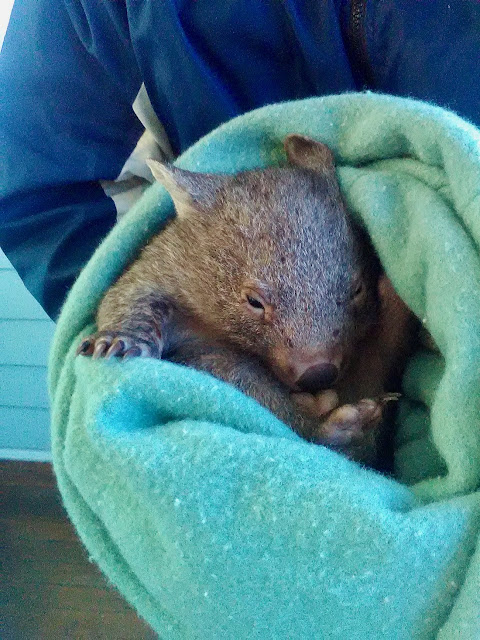Caring for Australian wildlife affected by fires
In the past week, I've had a couple of emails from international readers wanting to know about the native animals caught up in the unprecedented bush fires. We’ve had some rain over a large area but unfortunately, fires are still burning in some areas. We were all devastated to learn that three American men who came to Australia to help fight the fires, were killed when the plane they were fighting fires in crashed on Thursday. We send our sincere sympathy to their family and friends and thank them for the help they gave us. Rest in Peace.
This is a baby wombat rescued by Charles last year. Sadly the mother was run over by a car.
Unbelievably, it’s estimated that over a billion animals have been killed in the fires. Some animals got out to the fire edge and were found by wildlife workers and volunteers. Some of these animals have been rescued and taken to various places such as Taronga Zoo in Sydney and Australia Zoo here in Queensland, which is just around the corner from where we live. Sadly, many of the animals found were beyond help and had to be euthanased.
My nephew Charles sent two links for me to share with you; he has volunteered for Science for Wildlife since 2013. The first link shows a Science for Wildlife project in the Blue Mountains. https://chuffed.org/project/wildlife-bushfire-crisis. Dr Kellie Leigh and volunteers are working to establish drinking stations for native animals in the bushland. The link also has information on the Koalas rescued in Kangara Boyd National Park before the bushfires; they are currently in care at Taronga Zoo in Sydney.
The RSPCA is also working to rescue and care for as many animals as they can. This second link is to the RSPCA Queensland’s Wacol wildlife hospital https://www.rspcaqld.org.au/donate/koalas
Both websites will give you information about the help given to animals in care aa well as projects needed for ongoing care. You can donate at both sites and these funds will go directly to native animals and their welfare. To those readers overseas, both these organisations are well known in Australia and I recommend both to you as genuine and responsible. Be careful when donating to the fires. Only give to recognised organisations.













.jpeg)





.jpeg)
.jpeg)
.jpeg)
.jpeg)
2 Comments
I heard about that plane crash; it was so sad. This is such a mammoth disaster. The numbers are staggering. Thank you for the links. My heart goes out to all of the people there and the sweet animals. It's like Bambi. I am amazed at how my fruit trees have been thriving after the California fires. It's almost like they became stronger and fiercer. They fight and persevere. I hope you receive plenty of rain. It makes such a difference.
ReplyDeleteIt is a tragic situation. Many years ago we lived next to a field which caught fire and threatened the nearby homes. It was nothing in comparison to the Australian fires but I remember hearing the flames crackling and feeling quite scared that it wasn`t going to be contained. The animals are so vulnerable.
ReplyDeleteI welcome readers' comments. However, this blog never publishes business links or advertisements. If you're operating a business and want to leave your link here, I will delete your comment .